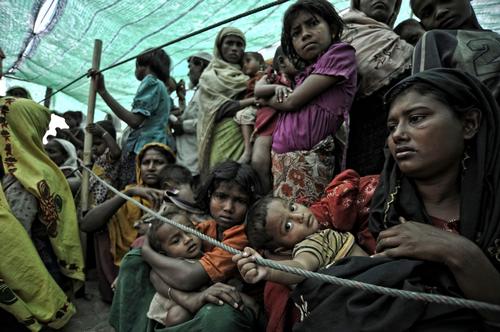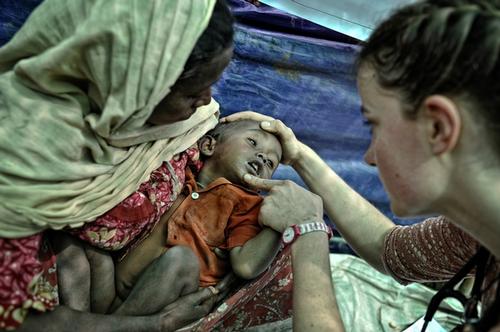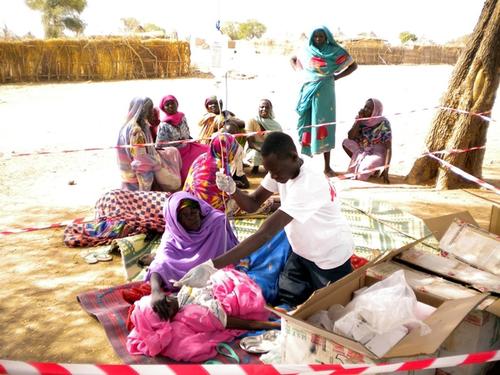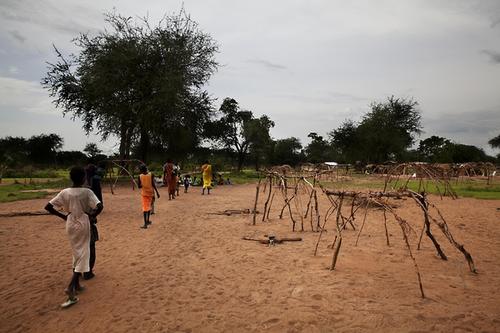Eight months since deadly communal clashes first broke out in Rakhine state, Myanmar, tens of thousands of people are still unable to access urgently needed medical care. Médecins Sans Frontières (MSF) calls on government authorities and community leaders to ensure that all people in Rakhine can live without fear of violence, abuse and harassment, and that humanitarian organisations can assist those most in need.
Thousands displaced and health services restricted
“We are very worried about our women; we have more than 200 pregnant women in our camp. For their delivery they cannot go to a health centre and they will have to deliver here… in the mud without a doctor,” said a man living in a displaced persons camp in Pauktaw township, Rakhine state.
Rakhine state in western Myanmar is home to numerous ethnic groups including the Rakhine community and a Muslim minority often referred to by the international community as the Rohingya.
In one of our biggest programmes worldwide, MSF has been working across Rakhine state for nearly twenty years, providing basic and maternal healthcare and treating diseases such as malaria, HIV/AIDS and tuberculosis (TB). Rakhine is Myanmar’s second-poorest state and has historically received less investment in healthcare than other areas of the country. Over the years MSF has treated hundreds of thousands of people across the state regardless of ethnic origin or religious affiliation.
In June 2012, deadly communal clashes in Rakhine state triggered an official state of emergency. An estimated 75,000 people were displaced – many had their homes burned down. Further outbreaks of violence in October exacerbated the humanitarian crisis, forcing an estimated 40,000 people to flee. Many ended up living in makeshift camps that lack sufficient shelter, water, sanitation, food and healthcare.
According to official estimates, the vast majority of those displaced are Muslim. In addition, hundreds of thousands more people still living in their homes have had very limited access to healthcare because medical services were cut off. Medical services still have not resumed. in many areas.
Thousands also fled the state. Many went to neighbouring Bangladesh, where an estimated 300,000 Rohingya refugees already live. The majority are undocumented and unregistered. Living in deplorable conditions, many have been struggling to survive in Bangladesh for years. MSF provides healthcare to unregistered refugees and local Bangladeshis outside one of the makeshift camps.
Other Rohingya have gone to Thailand and Malaysia. They say their main reason for leaving was to avoid extreme violence toward them and their families. “I can swear, in front of my eyes they killed a lot of people in my village … and I was the witness,” said a 15-year-old Rohingya refugee in Malaysia.

Violence has worsened harsh living conditions
The stateless Rohingya, lacking basic rights and freedoms, are subjected to severe restrictions and abusive treatment. Their health situation has been unacceptably poor for years.
Violence and displacement has worsened the already harsh living conditions that many people in Rakhine state were already enduring and further limited their access to healthcare.
Malnutrition as well as maternal and basic health needs have been particularly acute among this community for many years, while gaps in official healthcare services are more pronounced in areas where Rohingya live.
Since the outbreaks of violence, healthcare and other forms of humanitarian assistance – including services delivered by MSF – have been very slow to resume or even get going in some of the worst affected areas. Delays in permission, insecurity and repeated threats and intimidation by a small but vocal group within the Rakhine community have severely impacted our ability to deliver lifesaving medical care where it is needed most.
Healthcare gap in the camps
Since the clashes, communities that were previously living side by side, and in some places mixed together, are now divided and separated. Many thousands of people – mainly from the Rohingya community – remain unable to return to their homes. It is among these people, living in crowded and poor conditions in rice fields or other strips of land, that we are seeing the most acute needs.
Since October, MSF mobile teams have carried out more than 10,000 medical consultations in some of these areas. But medical needs are far from covered. MSF is currently working in 15 of the largest camps, but we do not have the capacity to work in the dozens of other smaller camps where conditions are likely to be equally poor.
A big obstacle is not having enough staff. Doctors and other essential personnel are too scared to work in Rakhine state. This fear is the result of sustained intimidation and threats against MSF workers by some members of the Rakhine community.
MSF is alarmed that this health gap is still not being filled by the government or other organisations. We urge the government to do more to create a safe environment for humanitarian assistance, and to encourage medical staff from other parts of Myanmar to help provide emergency healthcare in Rakhine.
Malnutrition, chronic coughing and diarrhoea
Where MSF has been able to run mobile clinics, the most common diseases we see are skin infections, worms, chronic coughing, diarrhoea and respiratory tract infections. Shelters are frequently inadequate, leaving people exposed to the elements, and there are often not nearly enough blankets to go around. Severe malnutrition is also a problem in many of the camps, particularly among children.
During one recent camp clinic, 40 per cent of children under five seen by MSF were suffering from acute diarrhoea.
“Our children are dying from diarrhoea, we all have diarrhoea; we need more healthcare. Our latrines are full. We can only dig holes up to 40 cm and then we hit salty water, so what should we do? The nearest source of water where we dare to go is 40 minutes by canoe. We received since we are here [since October] a tank with drinking water once,”said a man living in a displaced persons camp in Pauktaw township, Rakhine state.
People denied access to clean water
“The only drinking water pond we have is the one which we have to share with the cattle of the nearby village. Five minutes from here is a pond with crystal clear water. We don’t dare to go,” said a man living in a displaced persons camp in Pauktaw township, Rakhine state.
Lack of access to clean water is likely to be the cause of the high rates of diarrhoea. There is plenty of clean water available, but many of the displaced are being denied access to it.
People living in the camps are scared to leave or are at times prevented from leaving, due to fear of abuse or attack by hostile groups.
Medical referrals a serious challenge
Patients who are too sick or injured to treat on the spot need to be sent to hospital. The options for referring them to hospital are, however, very limited. Patients and the people transporting them often face hostility and intimidation. This is compounded by major logistical challenges, making for life-threatening delays.
“I cannot get my TB treatment anymore so I had to stop. Before the violence I went to the township hospital. Now I cannot go anymore,” said a man from Kyauktaw township.
Threats and intimidation need to be addressed
The horrific conditions in the camps and the severe impediments to medical referrals underscore the need for Myanmar authorities to ensure all people living in Rakhine are protected and have access to lifesaving assistance.
In pamphlets, letters and Facebook postings, MSF and others have been repeatedly accused of a pro-Rohingya bias by a small but vocal and influential group within the Rakhine community. One community leader recently described MSF’s medical aid to displaced persons outside their village as watering a plant, a plant he does not want to see watered.
It is this intimidation, and not formal permission for access, that is the primary challenge faced by MSF and others seeking to provide lifesaving humanitarian assistance. The authorities can do more to make it clear that threatening violence against health workers is unacceptable.
MSF is impartial, providing medical assistance where it is needed most
As an impartial medical humanitarian association, MSF provides medical assistance to those in need, irrespective of ethnicity, religion, creed or political convictions. We base our programmes on independent, impartial assessments that seek to provide medical care where it is needed most.
This is how we have operated throughout Myanmar and in Rakhine state for the past 20 years. The result has been the treatment of hundreds of thousands of people from all ethnic groups for diseases such as malaria, HIV/AIDS and TB. Yet the threats continue.
Being impartial means providing care where it is most needed, regardless of where patients come from, or what they believe in. The assistance that MSF and others can provide is being dangerously hampered by the hostility we face, leaving tens of thousands of people in desperate conditions without adequate help.
We urge the Myanmar authorities to provide greater protection to threatened groups and to help defend our commitment to bring assistance to those in need.
MSF has been providing healthcare around the world and in Myanmar for decades, meeting the medical needs of millions of people from countless ethnic origins. Across Myanmar, MSF provides more than 26,000 people with lifesaving antiretroviral treatment for AIDS and was among the very first responders to cyclones Nargis and Giri, providing medical assistance and survival items, and cleaning water sources for tens of thousands of people. MSF has worked in Rakhine state for the past twenty years, providing basic and reproductive healthcare as well as treatment for HIV/AIDS and TB. Before June, MSF had been conducting approximately 500,000 medical consultations annually. Since 2005 MSF has treated more than 1.2 million people from all ethnic groups in Rakhine state for malaria.






